Activity Level: Above Average
Hypoallergenic: No
Social Ability: Friendly
Skills: Trainability, Companionship
Intelligence: Above Average
Ideal Climate: Temperate, Cool
Boston Terriers, also known as Boston Bulls, are friendly companions whose origins are humble and sweet. These canines love to play and make new friends, and their iconic jaunty walk will take them anywhere—as long as you’re by their side.
Breed Overview
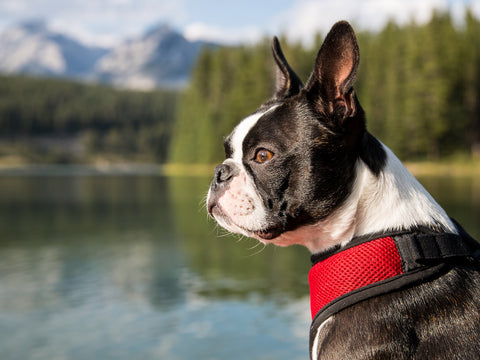 Origin: In 1875, Bostonian Robert C. Hooper purchased a bull/terrier type dog called Judge, who would later be famously known as Hooper’s Judge. Directly related to the very firsts of Bulldog and Terrier breeds, Judge had features from both genealogies in his blood, including the broad head and stocky frame. After breeding with a white bulldog-type female, their brood's coats were a uniform brindle of a white face and chest, white on their forelegs, and black everywhere else, which would become a part of their standard look.
Origin: In 1875, Bostonian Robert C. Hooper purchased a bull/terrier type dog called Judge, who would later be famously known as Hooper’s Judge. Directly related to the very firsts of Bulldog and Terrier breeds, Judge had features from both genealogies in his blood, including the broad head and stocky frame. After breeding with a white bulldog-type female, their brood's coats were a uniform brindle of a white face and chest, white on their forelegs, and black everywhere else, which would become a part of their standard look.
A few years later, the breed was shown in Boston, and fewer than twenty years after, the American Bull Terrier Club was formed in their support. Author James Watson had an unspecified level of authority in the club and suggested a name change; thus, the Boston Terrier Club of America was renamed. Their main purpose was to track the breeding of Bostons and register purebreds for showing, but their mission was, and is to this day, to support the betterment and preservation of the breed.
In 1893, the Boston Terrier broke ground as the first American canine breed to be admitted to the American Kennel Club, and the rest is history.
 History: For the first few years the Boston Terrier spent in the AKC, their colors and markings were not a major component of their standard; this meant that genetic diversity could thrive, resulting in bountiful broods of multi-colored pups. By the beginning of the twentieth century however, the standard changed in two major ways. Their distinctive marbled markings became a necessity, and their temperament was revised to include a balanced, friendly nature. This was not a far cry from their slightly aloof nature of the past, but it was significant enough to warrant a written change.
History: For the first few years the Boston Terrier spent in the AKC, their colors and markings were not a major component of their standard; this meant that genetic diversity could thrive, resulting in bountiful broods of multi-colored pups. By the beginning of the twentieth century however, the standard changed in two major ways. Their distinctive marbled markings became a necessity, and their temperament was revised to include a balanced, friendly nature. This was not a far cry from their slightly aloof nature of the past, but it was significant enough to warrant a written change.
In the early twentieth century, many canine breeds were selected for military use all over the world. Just to name a few, German Shepherds were utilized by the German military, English Bulldogs by the English, and Boston Terriers by the Americans. The US placed highly trained canines of many breeds in military positions, and in 1921 one famous military dog was Sergeant Stubby. This Boston Terrier became the most decorated canine of World War I after earning three service stripes, a wound stripe, and a military gold medal. By the time the second world war began, the majority of military dogs in western wars were Doberman Pinschers and German Shepherds. Luckily for Boston Terriers, they had become a coveted breed as companions and family dogs, owing to their intelligence and potential for guarding. Bostons spent the rest of the twentieth century living comfortable lives as companions and family pets, where they largely remain to this day.
Nowadays, a few Bostons can be found in media and pop culture. Boston University has had Rhett the Boston Terrier as their mascot since 1922, the Boston is the state dog of Massachusetts, and famous owners include Robin Williams, Topher Grace, and Joan Crawford.
Breed Attributes
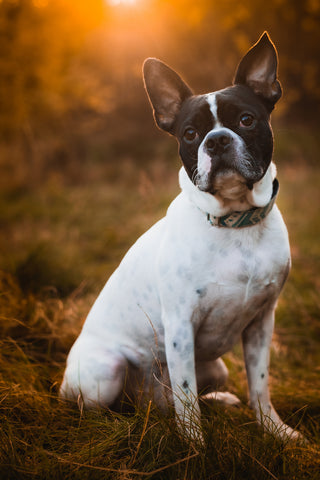 Temperament: Boston Terriers are known to be lively, intelligent, and affectionate to their owner, so their temperament is often linked to their connection to their human. Training your dog and bonding with them can contribute to their calm and collected attitude. Having an above average energy level, these canines will likely need automatic and puzzle toys to stay occupied if left home alone; their requirement for mental stimulation means they might act out if they have too much pent-up energy.
Temperament: Boston Terriers are known to be lively, intelligent, and affectionate to their owner, so their temperament is often linked to their connection to their human. Training your dog and bonding with them can contribute to their calm and collected attitude. Having an above average energy level, these canines will likely need automatic and puzzle toys to stay occupied if left home alone; their requirement for mental stimulation means they might act out if they have too much pent-up energy.
Bostons are also known to be highly vocal, and they often bark at more than the doorbell, wildlife, and snacks—they just have a lot to say! Obedience training can help curb this habit, but this is their main means of communicating with you and should not be punished.
Male Bostons may react negatively to other male dogs if they feel their territory is threatened, but obedience training and proper animal socialization techniques can help keep them calm and cool.
Personality: While every dog has their own personality, the breed standard for Bostons includes a friendliness toward humans and an openness to new friends. Sometimes seeming aloof, this breed tends to stick close to their pack and observe their surroundings until they are comfortable. This tough façade will fade as soon as the toys come out, and your playful Boston can enjoy their playtime with or without animal friends.
The most notable part of a Boston’s personality is their quirky attitude. They are known to be goofy, silly, and playful at all stages of their life, which can contribute to their overall happiness and their mental wellbeing as they age. It is recommended to encourage this play with your dog and offer them puzzle toys to help keep their mind active, even when you’re away.
Ideal Owner: You! Boston Terriers are fantastic companions who love playing and running as much as they love snuggling with their owner. They'll keep you on your toes, make you laugh, and keep you company with boundless affection.
Fur Care
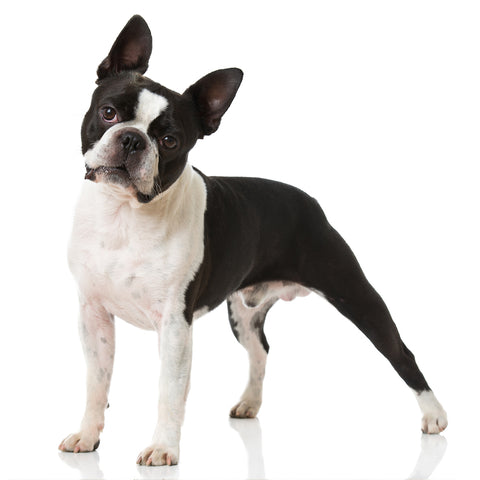 Grooming: Due to their short fur, Boston Terrier grooming is relatively easy. A weekly brushing session with a soft bristled brush and occasional baths may be all your Boston needs to keep their coat fresh. Veterinarians also recommend regular brushing to promote healthy circulation in the skin, which is crucial for maintaining dermatological wellness. Especially if your dog plays outside, regular bathing is essential to keep allergens out of the coat, reduce body odors, and maintain healthy skin.
Grooming: Due to their short fur, Boston Terrier grooming is relatively easy. A weekly brushing session with a soft bristled brush and occasional baths may be all your Boston needs to keep their coat fresh. Veterinarians also recommend regular brushing to promote healthy circulation in the skin, which is crucial for maintaining dermatological wellness. Especially if your dog plays outside, regular bathing is essential to keep allergens out of the coat, reduce body odors, and maintain healthy skin.
For an everyday bath, a simple Oatmeal Shampoo can do the trick as it cleanses and nourishes without harsh ingredients. If your Boston is itchy, try our Penny Royal Itch Relief Shampoo and let your pup enjoy a soothing wash that leaves them smelling and feeling refreshed.
Shedding: As with most Terriers, Bostons shed minimally, with the potential for more shedding in spring and autumn molting seasons . Any time of year, a quick brush and a bath can help remove loose fur and keep the coat healthy to minimize unnecessary shedding.
If your Boston Terrier sheds more than average, they may need more essential fatty acids in their diet. A dog supplement such as our Boston Terrier Omega HP Fatty Acid Chews help replenish healthy fats to support skin hydration, fur health, and normal shedding.
Colors: Black and White
More to Know: Boston Terriers tend to snore due to their short snout and facial shape.
Health
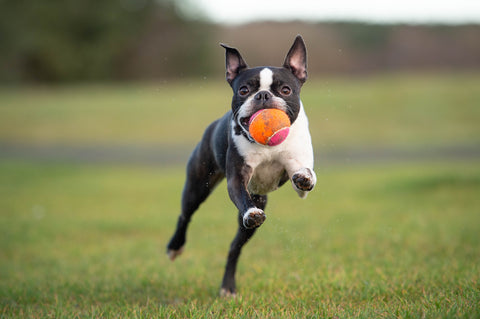 Common Issues: Thanks to their bountiful genetic origins, with Bulldog and Terrier stock combined, Boston Terriers are relatively healthy dogs. However, they are susceptible to a handful of health issues.
Common Issues: Thanks to their bountiful genetic origins, with Bulldog and Terrier stock combined, Boston Terriers are relatively healthy dogs. However, they are susceptible to a handful of health issues.
Their prominent eyes are vulnerable to corneal ulcers, which can be painful but are thankfully easy for a veterinarian to treat. Due to these large eyes combined with their short face means they can get debris such as sand and dirt in their eyes quite easily. Be mindful of potentially hazardous debris in their surroundings, and use dog goggles if necessary. .
Bostons are also predisposed to roaching of the back, a condition involving abnormalities in the spine, which can be very serious. This may be related to issues with the rear patellas (knee caps) that can cause the body to lean forward and the back to curve. This can be evaluated by a veterinarian with a simple x-ray.
This breed commonly exhibits Brachycephalism, a medical term for a short face. While this condition may appear without health consequences, it may have only minor implications such as impaired panting or increased snoring.
This list of predispositions is relatively short compared to some other canine breeds, but regular veterinarian visits are essential to maintain health and ensure your pup is living their best, healthiest life. Boston Terrier life expectancy directly depends on veterinary care, which starts at home
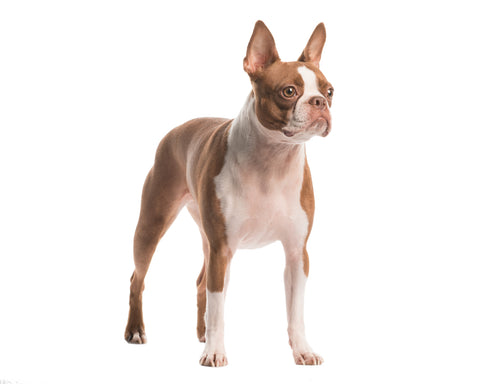 Nutrition: All dogs need high-quality sources of protein in their diet, such as pork, beef, and poultry. Nutritious dog food should include vitamins and minerals your dog needs, but not all commercial pet food options have these essentials. To help fill the gap, veterinarians recommend a canine multivitamin as a supplementary source of nutrients.
Nutrition: All dogs need high-quality sources of protein in their diet, such as pork, beef, and poultry. Nutritious dog food should include vitamins and minerals your dog needs, but not all commercial pet food options have these essentials. To help fill the gap, veterinarians recommend a canine multivitamin as a supplementary source of nutrients.
Boston Terriers are known to have sensitive digestive systems, so their diet should be monitored and should never include table scraps. Instead, you may feed your pup a healthy, balanced diet full of proteins, vegetables, and occasional treats. Many dogs enjoy fresh foods such as broccoli and carrots, which can add to their water and fiber intake. All of these factors can positively affect your Boston’s flatulence, which is the most common symptom of digestive upset for dogs.
A balanced diet is also essential for weight management, a must for small breed dog owners. It can be easy to overfeed a small dog, even a full grown Boston Terrier, as their daily caloric requirement is much lower than larger breeds. Be sure to keep an eye on what your pet eats, keep them away from table scraps, and limit treats.
Lifespan: 11-13 years
Physical Activity
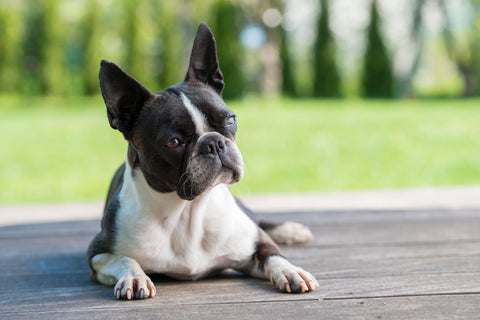 Training: Boston Terriers are renowned for their above-average trainability thanks to their eager nature. The average Boston loves to fulfill tasks and please their owner, so reward-based training can work very well. Early obedience training is key to keeping your pup cool and collected, and it can also contribute to normal anxiety levels. Crate and obedience training help your pet feel comfortable and safe in their environment, which helps prevent anxious or destructive behavior.
Training: Boston Terriers are renowned for their above-average trainability thanks to their eager nature. The average Boston loves to fulfill tasks and please their owner, so reward-based training can work very well. Early obedience training is key to keeping your pup cool and collected, and it can also contribute to normal anxiety levels. Crate and obedience training help your pet feel comfortable and safe in their environment, which helps prevent anxious or destructive behavior.
Exercise: Boston Terriers are compact and stocky, owing to their Bulldog ancestry, with plenty of muscle under their coat. These canines have an energy level considered to be above average, requiring at least two brisk walks every day as well as some play time. However, due to their shortened snouts, they cannot pant very well and therefore cannot tolerate intense exercise or hot weather. Be sure to keep an eye on their movement, breathing, and panting while outside, especially in the summer and in high humidity.

Boston Terriers are outstanding companions who are just as quirky as they are intelligent. They make fantastic family pets, and they’ll surely keep you off the couch with their energetic nature.

